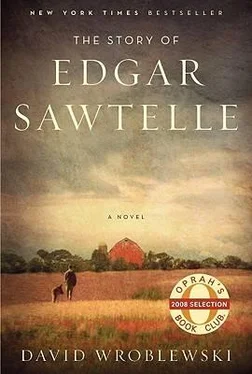“Stop now,” Doctor Papineau said, when she’d finished. He took the receiver from her hands and set it upside down on the hook. “That’s enough for one night.”
She looked back at the old man, corners of her mouth tucked, eyes shining.
“Okay,” she said. “That was…harder than I expected.”
She walked around the table to where Edgar sat and put her arms over his shoulders, letting her hands sign in front of him.
Are you okay?
He tried to reply and found he couldn’t.
I want you to go to sleep now.
What about you?
I’m going to sit quiet for a minute. Go. There’s nothing else to do.
She was right, he knew. His mother was a pragmatist, maybe from years spent training the dogs. Maybe she was born that way. He squeezed her forearms until he felt her pulse beneath his fingertips, then raised a hand to Doctor Papineau in silent good night.
AS THOUGH AGREED UPON beforehand, though it was not, he and Trudy slept in the living room. He’d carried a blanket and pillow downstairs and when he sat on the couch the power to go up again and change clothes deserted him. He pulled the hem of the blanket to his shoulders and drew up his knees and closed his eyes. A ringing began in his ears-perhaps lurking there all along but apparent only when the weight of the blanket dulled his senses. Half-slumber took him. His mother and Doctor Papineau turned out the lights and all was quiet and then a succession of images came forward, resurrected by some crow-eyed part of his mind that would neither wake nor sleep. Fragmentary emotions possessed and released him, drawn like garments from a wardrobe and discarded, one after another. Below that chaos of image and memory, something so powerfully suppressed he would barely remember it: the idea that everything once true in the world was now past, and a thousand new possibilities had been loosed. And, following that, a clap of overwhelming shame.
Sometime later he opened his eyes. His mother had drawn a blanket around her in her chair. She was tucked up into one corner. He had a faint memory of her kneeling beside him and running her hand, warm and smooth, across his forehead, palm touching his brow and ending with fingertips entwined in his hair. He had not opened his eyes in the moment. Her touch had released some tiny increment of the poison bound up in him that would, days to come, ripen into sorrow. And by the time he thought all this he could no longer tell if her caress had truly happened or whether he’d manufactured it out of necessity.
The sleep that followed was black, nothing at all contained in it. Every rasp of snow against the windows roused him up on one elbow only to have him collapse again into sleep, sawing between one world and the other. Papineau snored upstairs in the room they had once prepared for Claude. The sound penetrated the living room ceiling like the lowing of distant cattle: Moo. Moo. He woke again when he sensed Almondine walking away from him. In the dark he watched her press her nose against the blanket wrapped around his mother, scenting her as carefully as she must have scented Edgar the moment before. She stood for a time, panting softly, then returned to the center of the room. She circled and downed and their gazes met. Her ears shifted forward. After a while her eyes narrowed, then opened wide, then narrowed more, the liquid glint of them waxing and waning in the darkness. Finally, she sighed and slept.
Come morning, his memory would be of a night spent watching over them all. And each of them-dog and boy, mother and old man-would feel the same.
THEY WALKED TO THE BARN at first light. The cold was fearsome, the sky above dilute and punctured by stars. Inside the kennel, he saw they needed more straw, and he walked through the workshop and climbed the steps to the mow and flipped on the lights. The wall of bales stood tiered like a ziggurat. It was still early in winter-some bales still reached the rafters. A red-handled hay hook hung on a nail on the front wall. He dragged two bales to the center of the mow, lifted a hatch in the floor by a small ring, and looked down. Trudy stood below, waiting. “Go ahead,” she said. He pushed the bales through and watched them fall with a half-turn and whomp against the dusty cement.
He cleaned pens with a pitchfork and a wheelbarrow and dashed out fans of quicklime on the bare floors. When he cut the twine, the straw bales opened into golden sheaves. He pulled a slicker brush from his back pocket and hastily brushed the dogs. Doctor Papineau walked in while he was working, declared that he might as well look in on the pups, and disappeared through the door to the whelping room. Edgar went to his litter. Finch and Baboo, the least excitable, leaned on him from opposite sides. Essay tried to climb his front. He calmed them by cupping their bellies and muzzles and asked them to sit and do other small things in lieu of real training.
When they were done, Edgar and Trudy and the veterinarian walked up the driveway together. Doctor Papineau promised to call later and kept walking to his car and drove off. When Edgar came downstairs in fresh clothes, his mother was standing at the counter, broken receiver in her hands. He waited in the living room while she talked to someone at the telephone company about fixing the telephone. When she was finished, she came into the living room.
“You don’t have to go,” she said. “‘I’ll call Glen and say you’re not ready.”
You’re not going to Brentson’s alone. “Page can come with me.”
No.
She started to reply, then nodded. Almondine stood by the kitchen door while Edgar donned his coat, then trotted down the steps and stood by the truck. It was somehow even colder inside the cab. The vinyl seats flexed like tin. Trudy put the truck in gear and navigated up the long slope of the driveway and they drove along without conversation, listening to the crunch of ice beneath the tires. The world glowed translucent blue. Telephone poles rushed forward and fell away, wires swelling and dropping in the intervals. In Mellen, Trudy parked the truck in front of the cupolaed town hall and the three of them followed the arrows painted on the hallway until they reached the sheriff’s office. Even inside, their breath steamed. A burnt-hair smell permeated the building. A white-blond girl sat at a desk wearing a winter coat and mittens. At the center of her desk a microphone rested on a stand. She looked at them and stood and peered over the counter at Almondine. “I’ll get Glen. You’ll want to keep your coats on,” she said. “Something happened to the heat. We’re waiting for the repair guy from Ashland.”
The girl walked to the office door behind her desk and knocked. A moment later Glen Papineau emerged wearing his blue patrol jacket and hat, diminishing the room instantly. His hands, even ungloved, were like dinner plates. Edgar wondered, briefly, if Doctor Papineau had once been that big, then dismissed the idea. Old men got smaller as they aged, he knew, but no one could shrink that much.
“Trudy, Edgar, come on back. Sorry about the cold-boiler problems. You don’t want to know. I’ve been here since six. It’s a miracle we didn’t burst any pipes. Coffee, either of you? Hot chocolate?”
Trudy looked at Edgar. He shook his head.
“That’s okay, Glen,” she said.
“Well, bring ’em anyway, Annie-maybe they’ll heat the office a little. Cream and sugar in mine.”
He led them into an office somehow both spare and cluttered. Papers and notebooks mounded over his desk, but the walls were unadorned except for a framed certificate and a photograph of a youthful Glen in his Mellen High wrestler’s uniform, pinning some unknown behemoth in a fetal curl. In the picture Glen was up on his toes, almost parallel to the floor, body rigid as a log, veined thighs thick as a draft horse’s. The referee’s arm a blur as he slapped the mat.
Читать дальше
Конец ознакомительного отрывка
Купить книгу












